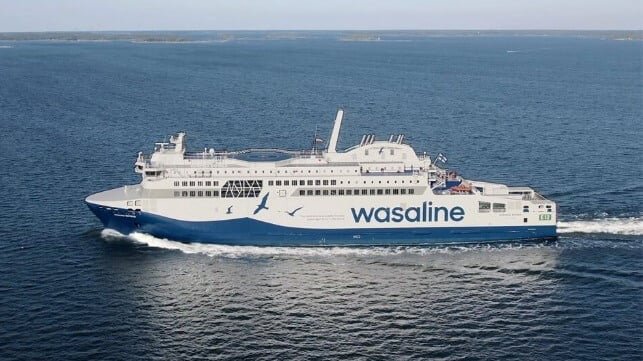Finland’s Wasaline Launches First Carbon-Neutral Shipping Route in the Baltic
Finland’s Wasaline is making waves in the maritime industry by introducing the first carbon-neutral shipping route in the Baltic region, surpassing its original goal set for 2030. Through strategic partnerships with Gasum and Stena Line, Wasaline’s vessel, Aurora Botnia, will operate solely on biofuel and battery power.
According to Peter Ståhlberg, Managing Director of Wasaline, “This unique collaboration with Stena Line and Gasum allows Wasaline to achieve carbon neutrality ahead of schedule, setting a new standard for sustainability in the industry. Passengers and cargo traveling with Wasaline can now do so with the assurance of being carbon neutral, all without any additional charges.”
The daily route between the ports of Vaasa in Finland and Umeå in Sweden will be powered by certified biogas, marking a significant milestone in the industry. DNV, in collaboration with the Nordic Roadmap for Green Shipping Corridors, recognizes this route as the first international green shipping corridor in operation, with a travel time of approximately 3.5 to 4 hours across the Gulf of Bothnia.
Gasum’s bio-LNG, a renewable fuel with significantly lower greenhouse gas emissions compared to fossil fuels, is produced from various waste streams such as biowaste, sewage sludge, and agricultural by-products.
Technical Details of the Vessel
The Aurora Botnia entered service in 2021, boasting a gross tonnage of 24,300 and a length of 492 feet (150 meters). With a freight capacity of 1,500 lane meters and the ability to accommodate up to 935 passengers, the RoPax vessel is equipped with dual-fuel Wartsila 31DF engines that can run on LNG, liquified biogas, and traditional marine fuels.
Initially fitted with a 2.4 MWh battery system, the vessel will undergo upgrades to incorporate an additional 10.4 MWh, making it the RoPax vessel with the largest battery capacity – 12.6 MWh – by January 2026. The integrated Wartsila energy management system allows seamless transitions between fuel and battery modes, enabling fully electric low-speed transits and maneuvering.
Niclas Mårtensson, CEO of Stena Line, highlights the benefits of integrating Aurora Botnia into the FuelEU Maritime pool, stating, “Access to previously unavailable biogas for Stena Line reduces emissions across the pool, cuts fuel costs, and solidifies our position in the industry amidst stricter regulations on biofuels.”
The collaboration between Wasaline, Gasum, and Stena Line not only supports the daily operations of Aurora Botnia but also serves as a blueprint for sustainable practices in the maritime sector.

